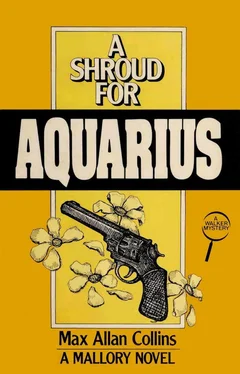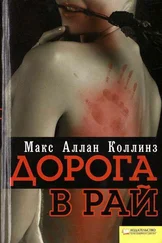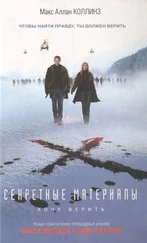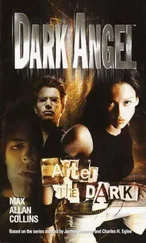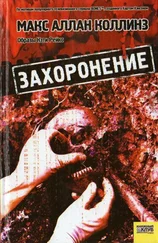The sound of footsteps clomped on stairs, a door opened in a wall at left that was otherwise a bookcase and a woman and a child entered. The plain, pigtailed, a-few-months pregnant woman in a blue sundress, over the top of which her pale bosom was blossoming, held the hand of a pretty little girl of about four, long red hair cascading onto the shoulders of a Strawberry Shortcake T-shirt. Her pants were pink and a little worn, probably secondhand, and she wore sandals. She had the memory of jam on her face, and looked like an urchin — but a well-fed, happy one. The face was Ginnie’s, mostly, the blue eyes particularly.
I went to the little girl and smiled at her. She wasn’t shy at all; she looked up and grinned right at me, saying, “Hi.”
“Hi,” I said, bending down to her level, looking her right in her mother’s eyes.
“My name’s Malinda. Everybody calls me Mal.”
“Everybody calls me Mal, too.”
“Really? But you’re a boy.”
“It’s the kind of name that both boys and girls can use.”
That seemed to go right by her; she just smiled at me with the bright yet empty eyes of childhood.
I said, “I was a friend of your mommy’s.”
“Mommy’s on a trip.”
I hadn’t realized they hadn’t told the little girl yet.
“I start preschool this year,” she said.
“Good for you.”
“Are you going to see Mommy?”
“I don’t know, honey...”
“If you see Mommy, say hi.”
“Okay. I will.”
She tugged at the pregnant woman’s hand, looking at me as she said, “We’re going next door for granola bars. Wanna come?”
“No, thanks,” I said, standing. “It was nice meeting you.”
They were out the door; the woman and I were never introduced, but exchanged a smile through the storefront window as the girl herded her along.
“I haven’t found a way to tell her,” he said.
“You ought to.”
“She’s so little.”
“She’s four going on fourteen. Tell her.”
“I suppose I should.”
“Is that why you weren’t at the funeral?”
He sighed heavily. “I called Ginnie’s mother. Originally we were going to be there, but I backed out. Said Malinda had a cold.”
“It isn’t an easy thing to face, is it?”
“No. I loved Ginnie. I still do. But she was still living her life only for herself, for her whims, one gamble after another. She never... never really lived up to the responsibilities of being a grown-up.”
“That’s a problem for a lot of people our age. Those good old days of yours were a supremely selfish time, despite all the love-generation talk. We were a bunch of spoiled kids, rebelling against those who gave us everything.”
He looked at me sadly. “Is that how you see the sixties?”
“Sometimes. Hell, what else were we, but spoiled brats who thought we discovered politics, when all we really discovered was dope.”
“I smoke a little dope still,” he said, reflectively, sipping his tea, “but that’s about the extent of my... chemical recreation these days. I was part of the drug culture, but I’m not proud of it. Not proud of the way it’s hung onto our generation, and spilled over into the next and the next... I don’t let my daughter see me smoke dope. I don’t know, maybe I’m being hypocritical in that.”
“Don’t sweat it,” I said. “She’ll probably see her friends doing it when she’s in grade school.”
That prospect didn’t cheer him up.
“Maybe Aquarius isn’t dead yet,” he said.
“Maybe it should be,” I said.
I finished my tea, picked up the paper bag of books, told him he had a nice daughter, and left.
The Port City jail was across from the courthouse, the latter a big white stone wedding cake of a structure that had an entire city block to itself and its sloping-on-all-sides lawn. The jail was considerably less grandiose, taking up only half a block, the rest of which was given over to a more modern, sprawling, one-story building that had once been a supermarket but which now housed a mental health clinic and the driver’s license bureau — any connection between which I’ll leave for you to draw. As for the jail, it resembled nothing more than a rather ordinary stone cottage, if a tad oversize. Of course most ordinary stone cottages don’t have three stories, a back yard enclosed by a ten-foot electrical fence, and windows with iron bars barely visible through thick wire-mesh cages. Anyone next door in search of either better mental health or a driver’s license might view this barred, wired, electric cottage as an incentive to drive the straight and narrow.
I parked out front, fed the meter (I too was driving the straight and narrow) and walked up the steps and inside, into the outer office, a room as wide as the building but not very deep. Paneled in light pine, its walls were decorated with framed documents and the complimentary calendars of several local businesses; there were four files, three desks, two vending machines (milk, coffee, Pepsi) and one deputy. It was still the lunch hour. I nodded to the deputy — who was younger than me, always a disconcerting thought — and he nodded toward Brennan’s office, indicating the sheriff was expecting me. I walked between two desks down a narrow hall and knocked at the door at its dead-end.
“Come on in,” Brennan’s voice said.
He was sitting behind his desk, studying a computer printout. His Stetson and summer jacket were on a coat rack to my left as I came in; the pine-paneled office was small, the desk and Brennan’s comfy chair and a few spare uncomfy chairs the only furniture. On the wall to the right were three pictures, each of ducks in flight, coordinated so that the ducks seemed to be trying to fly out of one picture into the next, leaving the final duck with nowhere to go. On the wall to the left were framed clippings of a big murder case about fifteen years ago that Brennan had cracked: a local woman stabbed her husband with a pair of scissors and, thanks to an infamous local legal whiz, got off with a year, and has been serving meals around the corner at her Katie’s Snack Kitchen ever since. The wall behind Brennan bore no pictures or clippings, just a window with a view, the view being iron bars, wire cage.
Brennan looked unhappy, even a little disgusted. He motioned toward one of the spare chairs, and I pulled it up and sat. He studied the read-out, saying, “Your friend’s name is Novack. James C. Novack.”
“My friend?”
He looked up, aimed some of his disgust my way. “The feller that dropped by your place around midnight, to rassle?”
“Oh. He’s still in the hospital, I suppose.”
“Nope. They let him out for the arraignment.”
I leaned forward. “When the hell was that?”
“This morning. Bail was set at ten grand.”
“Bail! He tried to kill me...”
“No,” Brennan said, waving a finger at me. “Simple B and E, possible A and B.”
“He had a gun! That makes it at least ADW—”
“No,” Brennan said calmly — a fake calm. “He didn’t fire it at you. You were the only guy that fired it.”
I smacked a fist in a palm, both of which were my own. “I should’ve been at that arraignment.”
Brennan shrugged elaborately. “You weren’t required to be; you weren’t needed, neither. Your statement was on record. It wasn’t no trial.”
“But there will be a trial, won’t there?”
A less elaborate shrug. “Maybe. He made bail.”
“Shit!”
“Luther Cross was representing him.”
Cross was that aforementioned infamous local legal whiz; sixty-some sharp-witted years of age now, Cross was a sleaze in a three-piece suit, the town’s most notorious slumlord as well as the guy to call if you killed somebody with a pair of scissors.
Читать дальше
